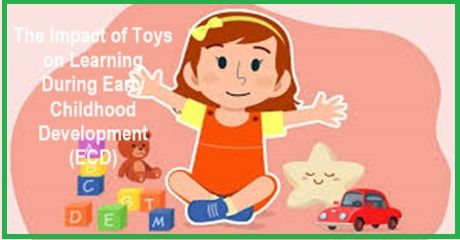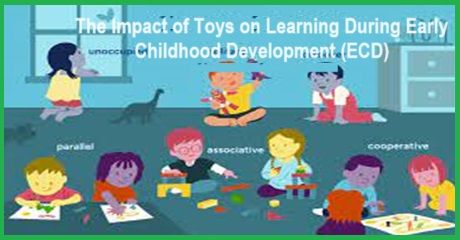Impact of Toys on Learning, toys play a fundamental role in the learning and development of young children during the critical early childhood years. …
Introduction:
Impact of Toys on Learning, Toys play a fundamental role in the learning and development of young children during the critical early childhood years. Beyond mere sources of entertainment, toys serve as powerful tools for exploration, creativity, problem-solving, and skill-building. Understanding the impact of toys on learning during early childhood development (ECD) is crucial for parents, educators, and caregivers in creating nurturing environments that facilitate optimal growth and learning. This write-up explores the multifaceted ways in which toys influence learning outcomes in ECD.
Stimulating Cognitive Development:
- Toys that engage children in cognitive activities such as puzzles, building blocks, and shape sorters promote problem-solving skills, spatial awareness, and logical thinking.
- For example, construction sets encourage children to plan, experiment, and problem-solve as they build and create structures.
- Puzzle toys challenge children to use trial-and-error strategies, spatial reasoning, and fine motor skills to fit pieces together.
- Shape sorters teach children about shapes, colors, and matching, enhancing their understanding of classification and categorization.
Enhancing Language and Communication Skills:
- Toys that encourage language-rich interactions and storytelling facilitate the development of vocabulary, communication, and literacy skills.
- Dolls, puppets, and action figures provide opportunities for imaginative play, role-playing, and narrative-building, promoting language development and social skills.
- Board games and card games promote turn-taking, cooperation, and verbal communication as children engage in rule-based interactions and discussions.
- Books, both fiction and non-fiction, serve as valuable educational tools that expose children to new words, concepts, and ideas, fostering a love for reading and learning.

Fostering Social and Emotional Learning:
- Toys that promote social interactions, empathy, and emotional expression contribute to the development of social and emotional intelligence in young children.
- Cooperative games, such as team sports equipment and collaborative board games, teach children about teamwork, sportsmanship, and empathy towards others.
- Dolls, stuffed animals, and pretend play sets provide opportunities for children to express emotions, develop empathy, and practice social roles and relationships.
- Sensory toys, such as stress balls and kinetic sand, offer soothing sensory experiences that help children regulate emotions, reduce stress, and build resilience.
Developing Fine and Gross Motor Skills:
- Toys that require physical manipulation and movement support the development of fine and gross motor skills, coordination, and balance.
- Playgrounds, climbing structures, and outdoor play equipment encourage children to engage in active play, develop strength, and refine motor skills such as climbing, jumping, and swinging.
- Arts and crafts materials, such as crayons, paintbrushes, and playdough, allow children to practice fine motor control, hand-eye coordination, and creativity as they engage in artistic expression.
- Ride-on toys, tricycles, and scooters promote balance, coordination, and spatial awareness as children navigate and maneuver their bodies in space.
Encouraging Creativity and Imagination:
- Toys that inspire open-ended play and creativity stimulate children’s imagination, innovation, and self-expression.
- Blocks, building materials, and construction sets empower children to design, engineer, and create their own inventions and structures, fostering creativity and problem-solving skills.
- Art supplies, such as paints, markers, and clay, provide children with opportunities for self-expression, experimentation, and exploration of different artistic mediums.
- Dress-up costumes, role-playing props, and imaginative playsets spark pretend play scenarios that allow children to explore different roles, identities, and narratives.
Conclusion:
The impact of toys on learning during early childhood development (ECD) is profound and multifaceted. From stimulating cognitive development and enhancing language skills to fostering social-emotional learning and promoting physical development, toys play a vital role in shaping the growth and development of young children. By providing children with a variety of age-appropriate, engaging, and educational toys, parents, educators, and caregivers can create enriching environments that support optimal learning, creativity, and holistic development during the critical early years of life.


Solvation is the critical step in activating cisplatin to its active forms, Pt NH 3 2 OH 2 Cl and Pt NH 3 2 OH 2 2 2, wherein chloride ions are displaced by water molecules precio priligy 30 mg In order to achieve these lofty ideals, a complex structure of institutions and mechanisms has been developed
I don’t think the title of your article matches the content lol. Just kidding, mainly because I had some doubts after reading the article.
Your article helped me a lot, is there any more related content? Thanks!
6k6qpa
hello!,I like your writing so so much! proportion we keep up a correspondence more about your post on AOL? I need an expert on this space to resolve my problem. Maybe that is you! Having a look ahead to look you.
wsfi0v
Make mornings more adorable with this Hello Kitty alarm clock CD player. Ideal for kids and collectors alike, this charming CD clock radio includes all the basics: AM/FM radio, programmable CD playback, and reliable alarm settings. Wake up to your favorite CD or a cheerful radio station with built-in stereo sound. A large digital display and simple controls make it easy to use, even for younger users. Combining cuteness with functionality, it’s a top pick among themed alarm clocks with CD players that bring fun and joy to your space.
Make mornings more adorable with this Hello Kitty alarm clock CD player. Ideal for kids and collectors alike, this charming CD clock radio includes all the basics: AM/FM radio, programmable CD playback, and reliable alarm settings. Wake up to your favorite CD or a cheerful radio station with built-in stereo sound. A large digital display and simple controls make it easy to use, even for younger users. Combining cuteness with functionality, it’s a top pick among themed alarm clocks with CD players that bring fun and joy to your space.
My brother recommended I might like this web site. He was entirely right.
This post truly made my day. You cann’t imagine simply how much time I had spent for this information! Thanks!
My blog :: nordvpn Coupons Inspiresensation
Thanks for sharing. I read many of your blog posts, cool, your blog is very good.